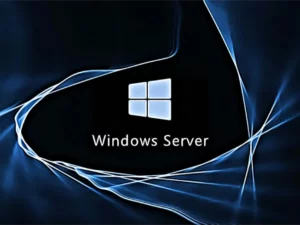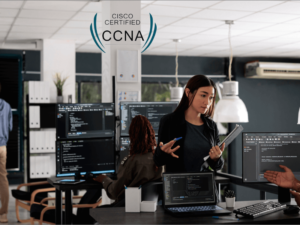CCNA: Switching, Routing, and Wireless Essentials
- Description
- Curriculum
- FAQ
- Notice
- Reviews
- Grade
Networking professionals play a vital role in connecting people, devices, and data across the globe. We need creative minds to help transform the way we work, live, and play. In this three-course series, you will build the skills you need for associate-level job roles like Network Administrator, System Administrator, or Network Engineer. You will also get ready to take the Cisco Certified Network Associate (CCNA) certification exam, an industry-recognized credential that validates your expertise and opens doors to exciting professional opportunities. CCNA: Switching, Routing, and Wireless Essentials is the second course in this series. This course covers topics in switching and routing and delves into wireless local area networks (WLANs) and security concepts. After completing this course, you’ll understand network operations and be capable of performing network configuration, troubleshooting, and mitigation of LAN security threats.
Objectives
By the end of the course, students will be able to:
- Configure VLANs and Inter-VLAN routing, applying security best practices.
- Troubleshoot inter-VLAN routing on Layer 3 devices.
- Configure redundancy on a switched network using STP and EtherChannel.
- Troubleshoot EtherChannel on switched networks.
- Explain how to support available and reliable networks using dynamic addressing and first-hop redundancy protocols.
- Configure dynamic address allocation in IPv6 networks.
- Configure WLANs using a WLC and L2 security best practices.
- Configure switch security to mitigate LAN attacks.
- Configure IPv4 and IPv6 static routing on routers.
Certification and Careers
The CCNA Routing & Switching curriculum helps students develop workforce readiness skills and builds a foundation for success in networking-related careers and degree programs.
Carrier Prep
By the end of the CCNA course series, students gain practical, hands-on experience preparing them for the CCNA certification exam and career-ready skills for associate-level roles in the Information & Communication Technologies (ICT) industry.
Prerequisites:
CCNA: Introduction to Networks
Estimated Time to Complete: 100 hours
Recommended Next Course:
CCNA: Enterprise Networking, Security, and Automation
-
1Chapter 1: Introduction to computer networkingTrial 2 Hours
Introduction to computer networks
-
2Chapter 2: Basic Switch and End Device ConfigurationTrial Text lesson
Implement initial configuration on a network switch and end devices, including passwords, IP addressing, and default gateway parameters.
-
3Quiz: Mobile / Native AppsTrial 5 questions
Productivity Hacks to Get More Done in 2018
— 28 February 2017
- Facebook News Feed Eradicator (free chrome extension) Stay focused by removing your Facebook newsfeed and replacing it with an inspirational quote. Disable the tool anytime you want to see what friends are up to!
- Hide My Inbox (free chrome extension for Gmail) Stay focused by hiding your inbox. Click "show your inbox" at a scheduled time and batch processs everything one go.
- Habitica (free mobile + web app) Gamify your to do list. Treat your life like a game and earn gold goins for getting stuff done!
The 50-hour, self paced course is the 2nd of 3 courses in the Cisco CCNA Enterprise curriculum. The course includes activities using Packet Tracer, hands-on lab work, and a wide array of assessment types and tools
The curriculum is appropriate for students at many education levels and types of institutions, including high schools, secondary schools, universities, colleges, career and technical schools, and community centers
for students at many education levels and types of institutions, including high schools, secondary schools, universities, colleges, career and technical schools, and community centers






